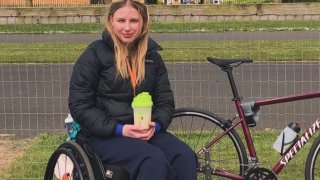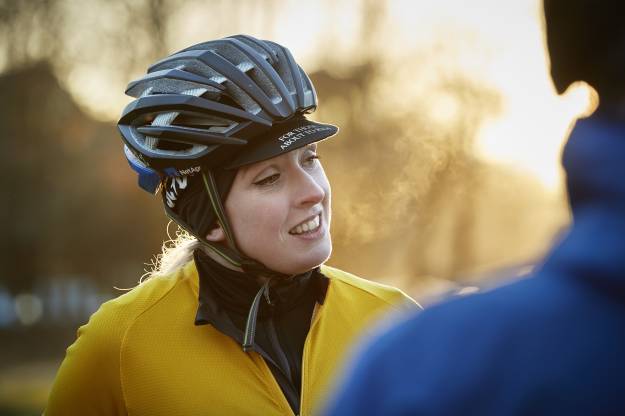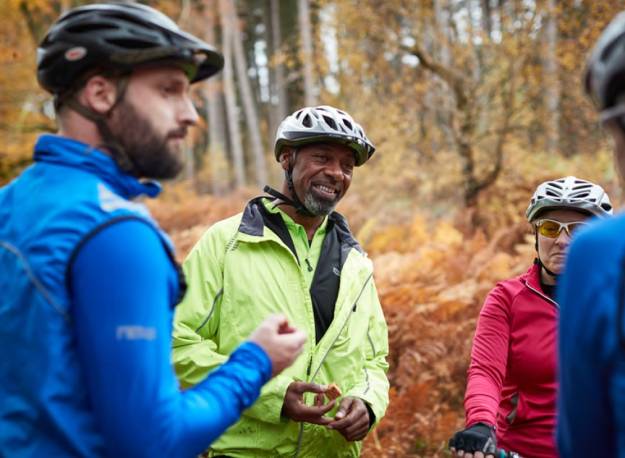Meet Emma Warner, a 19-year-old university student and para-cyclist, who has pursued her passion for cycling with determination, turning it into a key part of her life
Emma speaks openly about how cycling became a catalyst for rediscovering her sense of purpose after becoming Disabled at 16. Reflecting on her early athletic journey, she shares, “I grew up in an extremely sporty background. I was competing in high-performance swimming and running, and then when I became disabled, suddenly I couldn’t do everything that I did before.” This left her feeling lost and searching for something that could replace what sports once provided.
She found that sense of purpose again through cycling, offering her not just a physical activity but a community and structure that reignited her passion for sports. “It gave me the emotional support I needed to get myself back on track to get to where I am today.”
The joy of cycling also lies in the freedom it brings her, especially in contrast to her reliance on others. Emma describes her experience of cycling solo with palpable enthusiasm: “I’m so reliant on other people 24/7, because I am an ambulatory wheelchair user, but I can go out on a bike on my own for six to eight hours a day, and it is total bliss.” She smiles “It's just bliss”.
Discovering cycling
In August last year when Emma was scrolling through Instagram, she came across a post of Darren Hicks, an Australian Paralympic cyclist. “I saw Darren cycling, and it hit me - I knew I couldn’t ride a bike with two legs anymore because of my Disability, but maybe there was still a way for me to cycle,” she recalls. This moment became a turning point in her journey, “I got in touch with British Cycling, and within a week I visited a club called Track Nation and I was on a track on the back of a tandem before I knew it.”
This began the process of learning how to ride, in a new way “It was really daunting because while other people could just turn up, rent a bike, and jump on, I couldn’t do that anymore. There was a long process of adapting the back of a tandem and figuring out if it was even physically possible for me to ride safely again," she explains.
Limitless - a lifeline
Emma explains how the Limitless programme has been pivotal in her cycling journey: “Limitless means to me, at the minute, everything. It's the way I managed to get into cycling. My first track session was actually a Limitless session. There were coaches there. I got on someone else's tandem and adapted the back of it with a block of wood and some electrical tape. Electrical tape and some wood, that's all we needed!”
“None of that would have been possible without Limitless. I've seen time and time again, where they step in and go say ‘that's not going to work for you specifically, but! we could try this instead!’”
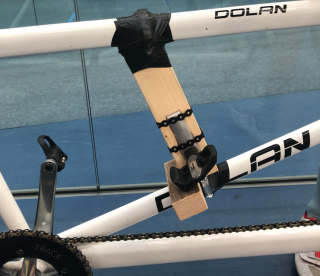
Racing
Despite being relatively new to cycling, Emma’s competitive journey took off quickly when she competed in the 2024 National Para Road Series. “I was barely six months into learning how to re-ride a bike at the first race!" she recalls. "At first, it was a bit chaotic - I didn’t know how to race, and I was still figuring out how to change gears. But once I got the hang of it, things really improved. I started picking up speed, and I’ve had great support from different companies along the way.”
Emma reflects on how she learned to enjoy racing despite the initial challenges. “We’re all different classifications,” she explains. “I know that I’m going to be dropped on that first lap because they’re all C4 and C5, then there’s me! Everybody is there to support you. Even if you've done the worst, you’ve ever done, everyone else will still encourage you to come back next time.”
One of her key achievements during races revolves around mastering her technique. “If I can get myself on the inside of a hairpin bend, I feel like I’ve won that whole race!”
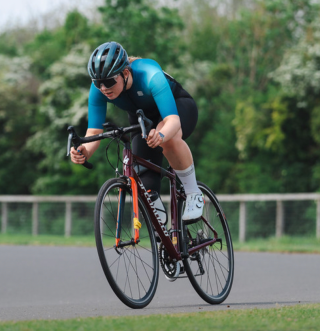
Emma discusses the significant evolution in her mentality, highlighting how cycling has reshaped her perception of her capabilities. She reflects, “I think it was the mental reassurance that I can still do sports. I can still perform and participate and even race. When I got back on a bike, I was constantly reassuring myself that it’s okay to be able to do these things again.”
Trailblazer
Emma is one of British Cycling’s Trailblazer, “It means we create social media content, as young people for young people, but I mainly specialise within talking about Limitless.” She was especially active throughout the Paralympics, "I created content focused on adaptive cycling and the different types of bikes available. I also dedicated a lot of time to explaining how classifications work and explaining the team pursuit, as it differs from ‘normal cycling'. I like to do that because social media was pivotal to how I started cycling again. I was so lucky I came across that photo of Darren when I did, because I don't think I've seen it since!”
Her love for social media fuels her activism “We need to have more awareness of inclusion and adaptive sports on the whole, especially within cycling. You might hear about ‘para cyclists in the Paralympics,’ but outside of that, when you watch sports, you don’t see adaptive bikes, tricycles, or hand cycles - they’re just not that common.”
Emma emphasises that: “the more awareness we generate, the more funding will be available for individuals in the long run. That way, people who may not be able to afford a hand bike can turn around and say, ‘I need a hand bike; where can I find that?’”
Balancing university, training, and competitions
Emma is in her fourth week at Derby University studying Occupational Therapy. “I chose it because the cycling performance programme is very good, and I already know their coach. It wouldn’t make sense for me to find a new coach at a different university. That would involve so much sitting down, going through all my medical history with them. It was like a no-brainer when I got an offer.”
Balancing university life with her cycling commitments proved to be a learning curve. She recalls, “In my first week at university I had a race, so I think I managed to get myself dumped in the deep end on that one.” This experience prompted her to take a hard look at her schedule, leading her to realise the importance of organisation. “I've had to sit down and build a whole timetable,” she explains. While some days allow for regular training, “other days it might be an hour's short gym session or a 30-minute stretch.”
Despite the rigorous demands, she emphasises the necessity of finding time to switch off, noting, “Even though I couldn’t ask for more with having access to academia and cycling, you still need that time to switch off. If you don’t have that, everything else will suffer.”
Identity beyond Disability
Emma powerfully articulates how cycling has “helped shape my identity beyond the label of being Disabled. It's given me a purpose… to do something more.” When she is on her bike, she explains, “In my head, I am not Disabled anymore. I'm just like every other person, and other people see me as every other person, even though my bike is adapted. I feel like I'm not ‘Emma with a Disability’ anymore; I'm ‘just Emma’.” This shift in perception fosters a deep sense of ownership over her own body. She shares, “I feel like my body's mine, and I feel like everybody else respects that this is Emma doing what she loves, and that is it. Nothing else, just that.”
However, she admits that she found the first few weeks of university hard, particularly during Freshers’ week. “Outside of the house, I have to use a wheelchair for my own safety,” she admits, acknowledging “I always feel like societal pressure tells us that we shouldn't acknowledge a wheelchair user, and if we do, we should be polite, open doors, do this, do that”.
“Let’s be realistic. The person in that wheelchair is just your bog-standard teenage girl. She wants to go out; she wants to gossip.” Emma found it hard to connect with others until she got on her bike, where she experienced a breakthrough moment. “A bunch of boys came out of the football club and started chatting to me, and they didn’t realise until someone pulled my wheelchair out of the car.” This moment highlights something Emma wishes more people understood “There’s more to being in a wheelchair. We're not all the same; we’re still people that have emotions and like to do different stuff.”
Looking Back and Future Goals
Reflecting on her evolution with cycling, Emma contrasts her initial expectations with her current feelings: “When I first started, I thought it was just going to be a few months and then I’d probably lose interest. Now, cycling represents freedom for me - it's a way to escape my disability and the everyday life I navigate. It gives me a massive sense of purpose. Cycling is truly life changing.”
Emma’s aspirations for the future in cycling are ambitious. As a Limitless rider, she is eager to return to the National Para Road Series next year to enhance her times, races, and technique: “I want to hopefully do a lot better than this year.” She is also committed to increasing miles and creating more support for Disabled individuals in cycling while raising awareness around the sport. “I’d love for it to go international - Team GB, LA (the next Olympics),” she shares, although she acknowledges the current limitations, saying, “sadly I don’t qualify under UCI classifications.”
However, her university believes she may be able to compete under BUCS (British Universities and Colleges Sport). They are actively advocating for her participation, and with the BUCS National Track Series taking place in Derby this year, Emma remains optimistic. “We shall see!” she concludes.
Her advice for young people with Disabilities considering sports? Of course, it is as eloquent and encouraging as Emma herself: “Try it, just give it a go. Nothing should stop you as long as you've got the right support in place.”
She also has high praise for local cycling communities “Get in contact with a local club or a local Limitless club. If you're looking for adaptions or anything, the best place I would say to go is your local bike shop because for me that's where my whole adapting really started for my bike. A local bike shop or a local club can take you a long way.”
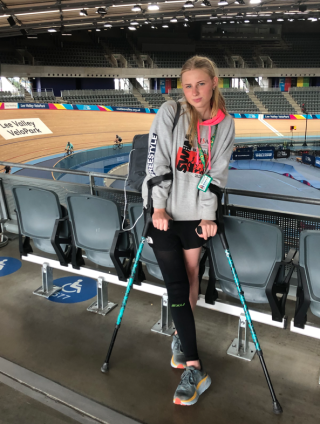
Find out more about cycling for Disabled people and paracycling


